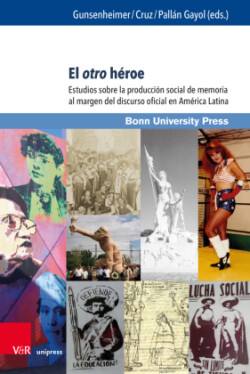¿A quién corresponde la fama en la memoria? En América Latina, las políticas nacionales de la memoria se han basado en la veneración de héroes, apoteizados por sus actos sobrehumanos e inaccesibles desde el ámbito cotidiano. Con el 'otro héroe' y la 'otra heroína' nuestra mirada se dirige hacia la evolución de modelos de referencia alternativos, surgidos de la memoria social y al margen del discurso oficial. A través de dieciocho estudios individuales examinamos la elevación del 'otro héroe' bajo cuatro aspectos: la resurrección del sujeto subalterno; el rol de la comunidad conmemorativa en las diversas dinámicas histórico-políticas y literarias; la reintroducción de 'nuevos héroes' por parte de académicos y finalmente, la polémica suscitada por culturas de memoria controversiales, ejemplificada a través de monumentos demolidos, redes de medios sociales y grafitis políticos.
Nationale Erinnerungspolitiken beruhen auf der Verehrung stilisierter Heldenfiguren. Unser Blick auf den lateinamerikanischen Raum und seine Helden-Produktion gilt jedoch dem "anderen" Helden in vier Aspekten. In 18 Einzelstudien aus 10 lateinamerikanischen Ländern und Epochen untersucht dieser Band den (posthumen) Aufstieg Subalterner - den Mitgliedern von Randgruppen und Frauen - zu nationalen HeldInnen. Es wird beispielhaft analysiert, wie der Heldenstatus historisch und literarisch gefasst sowie politisch verordnet, aber auch wieder entzogen werden konnte. Die Beiträgerinnen und Beiträger betrachten 'Helden' ohne Aussicht auf Heldenstatus in der nationalen Arena und die Ausdrucksformen heutiger kontroverser Erinnerungskulturen am Beispiel demolierter Monumente, sozialer Medien und politischer Graffiti.
National memory politics are based on hero cults. However, our glance on Latin America and its hero production is directed towards the 'other' hero, underscoring fourfold aspects. Through 18 case studies about ten American countries and epochs, this volume examines the (posthumous) rise of subaltern figures - members of marginalized groups and women - who became national heroes. Based on individual case studies, it will be analyzed, how the 'hero status' was historically and literarily constructed and politically managed, but also how this status could be withdrawn on political grounds. We thematize historical figures that can be regarded as 'heroes' even if they failed to attain heroic status in their national arenas and we study representational forms of currently controversial memory cultures, exemplified by demolished monuments, social media and political graffiti.

















